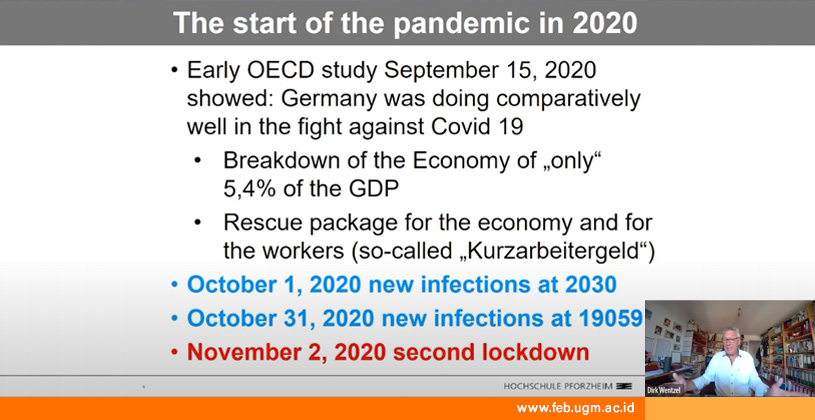Assessment of the Economic Implications of the Corona Pandemic on Germany and the European Union
- Details
- Written by FEB UGM
- Category: News
- Hits: 3233

The economic impacts of the Corona Pandemic are felt by all parts of the world, including Germany and the European Union. This becomes a valuable lesson, not only for Germany and the European Union, but for all countries in the world who are trying to examine the impact of the corona outbreak on the national and international economy. Responding to this, on Thursday (30/7) international Week (iWeek) held a lecture delivered by Prof. Dr. Dirk Wentzel, a lecturer at Pforzheim University. This lecture has the title “Economic Implications of the Corona Pandemic on Germany and the European Union (with a special focus on the sports and media sectors)”. As explained in the title Prof. Dirk, the discussion of the economic implications of the pandemic will also be narrowed down to the sports and entertainment media sectors.
Prof. Dirk started his iWeek lecture with an introduction to the big picture of the pandemic's challenges to science, health, the economic system, and political stability. The corona pandemic has attacked all corners of the earth, placing the countries of the world at a common threat, and opening up institutional weaknesses in every country in the world. Prof. Dirk continued to explain specifically about the economic impact that occurred in Germany and the European Union. A study conducted by the Organization for Economic Cooperation and Development (OECD) explained that comparatively, Germany was doing quite well in countering the economic impact of COVID-19, as evidenced by the economic damage that 'only' reached 5.4% of Gross Domestic Product (GDP) and efforts to distribution of rescue packages to workers, or what is commonly called Kurzarbeitergeld. However, this did not last long, Germany decided to do its second lockdown in November 2020. This lockdown, plus a new wave of neglected pandemics, which massively brought down the German economy, explained Prof. Dirk.
Prof. Dirk also explained about the existence of two curves, namely health and economy. Prof. Dirk explains that the two are intertwined. For example, if the pandemic continues then macroeconomic costs will grow further. Concern is also growing because according to an Oxfam study (2021) the effects of the corona pandemic have an unequal distribution and tend to harm the poor. To base his presentation, Prof. Dirk also conducted a historical assessment related to the economic crisis which was possibly commensurate with the effects of the COVID-19 pandemic. The assessment concludes that health crises such as the 1918 Spanish Flu cannot be compared to the impact of COVID-19 catalyzed by the world's economy and tourism which is now highly interdependent.
The huge impact of the pandemic has also shifted the German state budget. In 2021, the German government launched a public debt of 218.5 billion euros, which was the highest German debt record in history. So the question arises about the fiscal and financial policies that the German government should carry out. From the perspective of the European Union, the integrated European Union formulates solutions to the effects of the pandemic. The European Union answers these problems with the discourse of “Next Generation EU”. Next Generation EU issued a rescue fund of 750 billion euros in the form of bonds. The Next Generation EU also plans to cut the Green Deal fund to fight climate change in Europe from 40 billion to 17 billion Euro.
Prof. Dirk then presented two case studies, namely the sports and entertainment sectors. The characterization of the sports sector can be divided into microeconomic aspects and macroeconomic aspects. Sports have and influence sources of income in various sectors ranging from match tickets, sponsorship, merchandise, media, championship prizes, and athlete transfer prizes. However, the lockdown and the pandemic situation have slowed the mobility and education of athletes and reduced athlete income and income for clubs. Based on these conditions, the German government issued the "Coronahilfe Profisport" and issued a rescue package of 200 million Euros. The opposite was experienced by the media sector. The media is experiencing a profit boom due to adaptation and the rapid increase in digitization. For example, Streaming Video On Demand (SVOD) platforms such as Netflix and DAZN are experiencing a rapid increase in users and traffic. The increase in revenue was also experienced by search engines, online shopping sites, as well as online communication and meeting platforms such as Zoom and Webex.
At the end of the session, Prof. Dirk recapped the economic impact of the global pandemic, especially for the European region. More specifically, the corona has massively injured trade and supply chains. However, countries showed strong resistance through economic resilience and international cooperation such as the G7 Summit. Prof. Dirk then optimistically explained that full vaccination would be the key to economic revival over the global economic crisis.
Reportage: Hayfaza Nayottama
Video: https://youtu.be/ZW3OEAWeaKk


